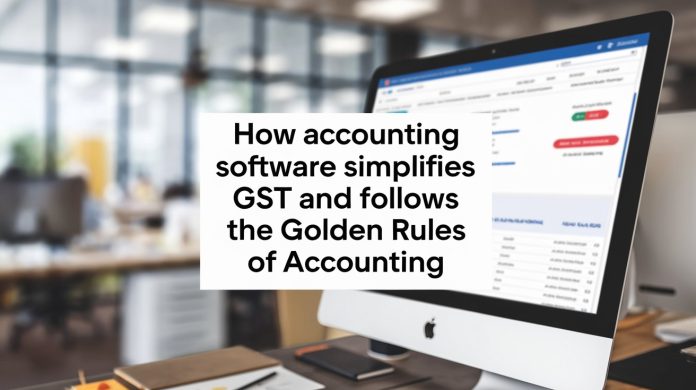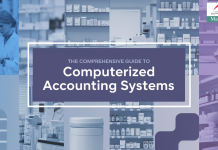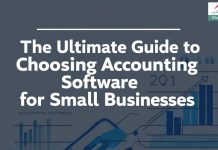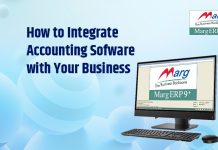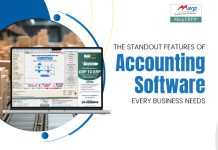Accounting software is now an important part of any business that wants to keep track of its money in today’s fast-paced business world. In addition to making sure accurate bookkeeping, it makes complicated tasks like GST compliance easier to do. Accounting software helps businesses follow the golden rules of accounting and government tax rules by automating and streamlining financial transactions. This blog post will talk about how accounting software makes GST accounting easier and helps businesses use management and cost accounting principles correctly.
Understanding the Golden Rules of Accounting
The foundation of any accounting system is based on three golden rules of accounting that help in maintaining consistency and accuracy in financial records. These rules are crucial in ensuring businesses adhere to standard accounting practices.
- Real Account: “Debit what comes in, credit what goes out.” This rule is followed when accounting for tangible or intangible assets.
- Personal Account: “Debit the receiver, credit the giver.” This rule applies when transactions involve individuals or entities.
- Nominal Account: “Debit all expenses, credit all incomes.” This rule governs the accounting of all income and expense transactions.
Accounting software plays an essential role in automating these rules. For instance, whenever a transaction occurs, the software automatically debits or credits the correct accounts, ensuring that the golden rules are adhered to and that all financial data is recorded accurately. This reduces human error and ensures the company’s financial statements are in line with accounting standards.
Functions of Management Accounting
Management accounting involves the use of financial data to assist management in decision-making. It helps in internal analysis, planning, controlling, and evaluating the overall performance of the organization. The key functions of management accounting include:
- Planning and Budgeting: Helps businesses prepare financial forecasts and plan for future expenses.
- Cost Control: Keeps track of costs and ensures that the business stays within budget.
- Performance Evaluation: Assesses the business’s financial health by analyzing financial statements.
- Decision-Making: Provides valuable data to aid management in making informed decisions.
Accounting software assists in these functions by providing real-time access to financial data, allowing managers to make timely and accurate decisions. Automated financial reports, expense tracking, and budget monitoring features enable businesses to plan more efficiently and evaluate performance without relying on manual processes.
Nature and Importance of Management Accounting
Unlike financial accounting, which is concerned with external reporting, management accounting focuses on internal financial management. It deals with providing information to help managers make informed decisions regarding the business’s operations.
The nature of management accounting involves:
- Analyzing financial data internally to assess business performance.
- Offering guidance on budgeting, cost control, and resource allocation.
The importance of management accounting lies in its ability to help managers:
- Make better pricing and budgeting decisions.
- Plan resources effectively and allocate funds efficiently.
- Forecast financial outcomes and improve operational efficiency.
Accounting software supports management accounting by automating data collection, analyzing financial trends, and providing up-to-date reports, which enhance decision-making.
Advantages of Management Accounting
The use of management accounting provides several advantages for businesses:
- Improved Decision-Making: With accurate, real-time financial data, managers can make informed decisions quickly.
- Cost Efficiency: By tracking and analyzing costs, management accounting helps identify areas where expenses can be reduced.
- Better Planning: With clear insights into financials, businesses can forecast and plan more accurately.
- Timely Reporting: Software-generated reports allow businesses to evaluate their financial health on-demand.
Accounting software simplifies these functions by eliminating the need for manual calculations, reducing human error, and offering instant reports for analysis, making the advantages of management accounting more accessible and efficient.
Functions of Cost Accounting
Cost accounting focuses on determining, analyzing, and controlling the costs of production. Its main functions include:
- Cost Analysis: Identifying the costs associated with production processes, labor, and materials.
- Cost Control: Ensuring that production costs do not exceed the budget.
- Cost Reduction: Identifying areas for reducing expenses while maintaining quality.
- Inventory Valuation: Determining the cost of inventory at any given time.
Accounting software plays a crucial role in cost accounting by automating cost tracking and ensuring that cost data is accurate and up-to-date. With automated reports, businesses can easily monitor costs and take necessary actions to control them without manual interventions.
Advantages and Disadvantages of Cost Accounting
Advantages of Cost Accounting:
- Cost Insight: Provides detailed insights into production costs, helping businesses understand the cost structure.
- Informed Pricing: Cost accounting helps businesses make informed decisions regarding product pricing and sales.
- Efficiency Gains: By tracking costs, businesses can find ways to improve operational efficiency and reduce waste.
Disadvantages of Cost Accounting:
- Data Collection Challenges: Gathering detailed cost data can be time-consuming and complex.
- High Setup Costs: Implementing cost accounting systems may involve high initial setup costs.
- Complexity: The analysis and interpretation of cost data can be challenging without the proper expertise.
Accounting software addresses these challenges by simplifying the data collection process, automating cost calculations, and providing businesses with easy-to-understand cost reports. This helps businesses overcome the complexities of cost accounting and enables them to make quicker, more accurate decisions.
GST Accounting: Simplifying GST with Accounting Software
One of the biggest challenges businesses face today is complying with the Goods and Services Tax (GST) regulations. GST accounting involves managing input tax credits, and output tax liabilities, filing returns, and ensuring accurate tax reporting. Accounting software greatly simplifies the process of GST accounting.
How accounting software simplifies GST:
- GST Calculation: Accounting software automates GST calculations on every sale and purchase, ensuring accuracy and compliance.
- GST Returns: Software generates GST returns (e.g., GSTR-1, GSTR-3B) and helps businesses file them on time.
- Seamless Integration: The software integrates with GST tax rules and updates automatically, ensuring businesses remain compliant with the latest regulations.
Benefits of using accounting software for GST:
- Reduces Errors: Automated calculations minimize the risk of errors, ensuring accurate GST filings.
- Time-Saving: Generating and filing GST returns becomes faster and more efficient, reducing the administrative burden.
- Real-Time Tracking: Businesses can track GST payments, liabilities, and input-output credits in real time, simplifying tax reporting.
Conclusion
Accounting software plays a pivotal role in simplifying financial management by adhering to the golden rules of accounting, automating management and cost accounting functions, and ensuring smooth GST compliance. By eliminating manual processes, reducing errors, and providing real-time insights, accounting software empowers businesses to make informed financial decisions, optimize costs, and maintain compliance with tax regulations.
For any business, adopting a reliable accounting software system is no longer just a convenience – it’s a necessity for growth and success. So, consider integrating accounting software into your operations today for better financial management and GST compliance.
Read more useful content:-
- How Accounting Software Simplifies GST and Follows the Golden Rules of Accounting
- Exploring Different Types of Billing and the Software for Distributors
- Best Payroll Software in India for Startups, Construction, and Cloud-Based
- Revolutionizing Pharmacy Operations with Advanced Software
- Improve Sales with a Point of Sale System for Supermarkets

